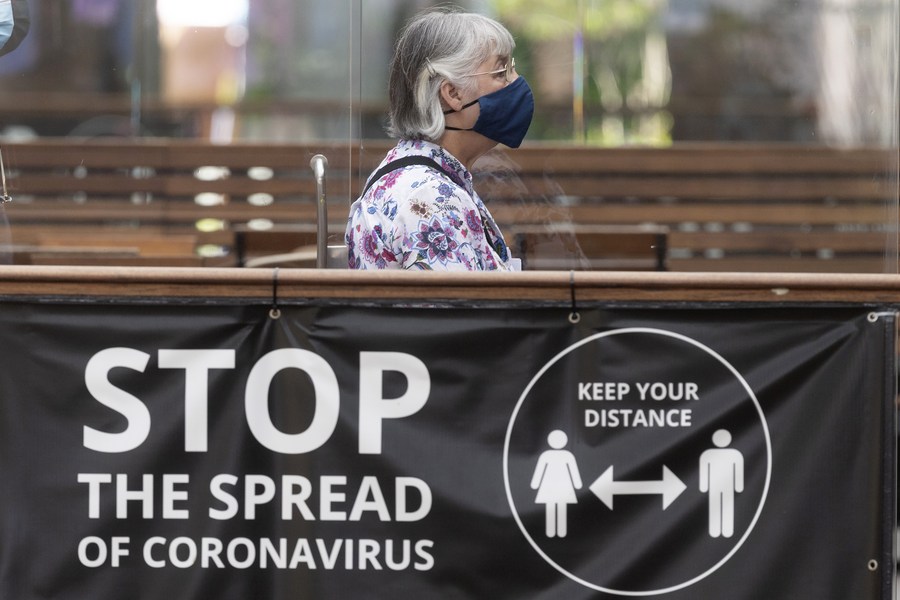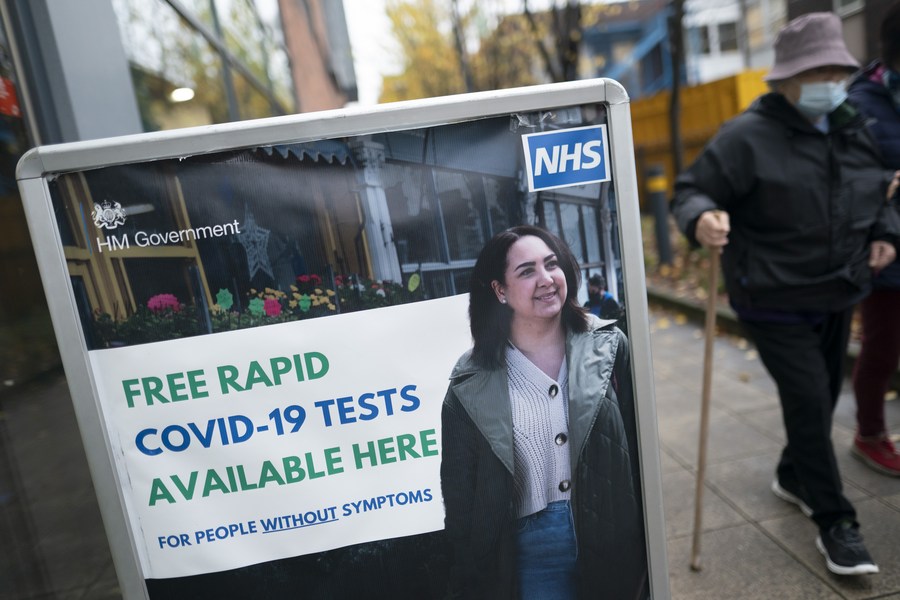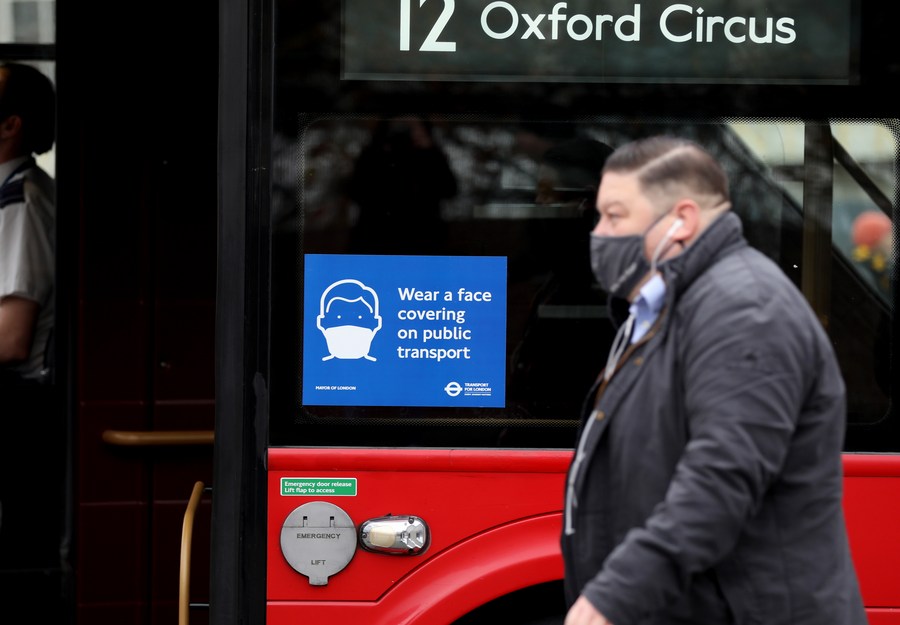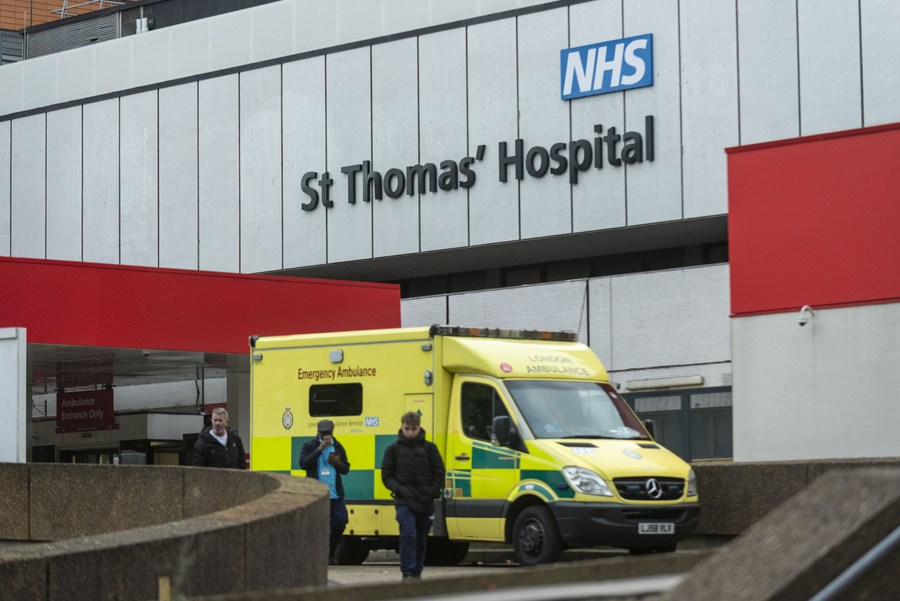UK coronavirus cases top 10 mln amid concerns over new variant

A woman wearing a face mask walks past a COVID-19 safety sign in London, Britain, on July 19, 2021. (Xinhua/Ray Tang)
A new variant of the coronavirus with a "constellation" of mutations has been identified in Botswana. Tom Peacock, a virologist at Imperial College London, branded the mutations "really awful" on Twitter.
LONDON, Nov. 25 (Xinhua) -- More than 10 million coronavirus cases have been recorded in Britain since the start of the COVID-19 pandemic, according to official figures released Thursday.
The country reported another 47,240 coronavirus cases in the latest 24-hour period, bringing the total number of coronavirus cases in the country to 10,021,497.
Britain also recorded another 147 coronavirus-related deaths. The total number of coronavirus-related deaths in Britain now stands at 144,433. These figures only include the deaths of people who died within 28 days of their first positive test.

People walk past a sign of free rapid COVID-19 tests in Manchester, Britain, Nov. 10, 2021. (Xinhua/Jon Super)
The latest data came as coronavirus cases surge across Europe, making the continent the epicentre of the pandemic again.
Meanwhile, a new variant of the coronavirus with a "constellation" of mutations has been identified in Botswana.
Designated as B.1.1.529, scientists are still unclear whether existing antibodies would react well to the variant, which has 32 spike protein mutations.
Tom Peacock, a virologist at Imperial College London, branded the mutations "really awful" on Twitter.
"Given the large number of mutations it has accumulated apparently in a single burst, it likely evolved during a chronic infection of an immunocompromised person, possibly in an untreated HIV/AIDS patient," said Francois Balloux, professor of computational systems biology and director of Genetics Institute at University College London.
"For the time being, it should be closely monitored and analysed, but there is no reason to get overly concerned, unless it starts going up in frequency in the near future," Balloux said.

People queue up outside a vaccination center in Manchester, Britain, Nov. 10, 2021. (Xinhua/Jon Super)
Earlier this month, England's deputy chief medical officer, Jonathan Van-Tam, said the modelling is "getting more difficult to give us any clear sense of whether things will turn up or down."
"We're in for potentially some difficult months over the winter," he told reporters.
However, British Prime Minister Boris Johnson said earlier this week that there is "nothing in the data saying we need to move to Plan B" in Britain.
"The best single thing you can all do is get your booster. When you are called forward to get it, please do so," Johnson said to reporters after his speech at the Confederation of British Industry (CBI) annual conference.

A man receives the second dose of the Pfizer-BioNTech COVID-19 vaccine at Hyde Leisure Centre in Greater Manchester, Britain, on Jan. 7, 2021. (Xinhua/Jon Super)
Plan B involves advice to work at home and requirements to wear masks in certain scenarios.
In a recent report, the National Audit Office (NAO) said that the coronavirus pandemic exposed Britain's vulnerability to whole-system emergencies and left the British government unprepared.
The government did not act on warnings from pandemic simulations carried out prior to COVID-19 based on an influenza outbreak, said the NAO.
Gareth Davies, head of the NAO said: "This pandemic has exposed the UK's vulnerability to whole-system emergencies, where the emergency is so broad that it engages all levels of government and society. Although government had plans for a flu pandemic, it was not prepared for a pandemic like COVID-19 and did not learn important lessons from the simulation exercises it carried out."

A man wearing a face mask walks past a bus in London, Britain, on Nov. 24, 2021. (Xinhua/Li Ying)
In its conclusions, the NAO called on the British government to strengthens its preparations for system-wide emergencies. It suggested the Cabinet Office establish who leads and manages system-wide risks, and strengthen oversight and assurance arrangements over preparations for system-wide emergencies.
Meanwhile, a research has found the NHS is facing the "most difficult winter in its history," with almost 90 percent of hospital trust leaders feeling "extremely concerned."
NHS Providers, which carried out the survey, said that while cases of COVID-19 are "well below" their peak in January, some trusts are "beyond full stretch."

People pass an ambulance outside the emergency entrance at St Thomas' Hospital in London, Britain, on Nov. 9, 2021. (Photo by Stephen Chung/Xinhua)
It is urging the government to offer cash bonuses of about 500 pounds to stop social care staff leaving for jobs in "hospitality, supermarkets, or online firms such as Amazon."
More than 88 percent of people aged 12 and over in Britain have had their first dose of vaccine and more than 80 percent have received both doses, according to the latest figures. More than 28 percent have received booster jabs, or the third dose of a coronavirus vaccine.
To bring life back to normal, countries such as Britain, China, Germany, Russia and the United States have been racing against time to roll out coronavirus vaccines.
Photos
Related Stories
- Hohhot launches COVID-19 vaccination campaign for children aged 3 to 11
- China-developed oral COVID-19 drug expected to be approved for market use in December
- COVID-19-related deaths in Europe could reach 2.2 mln by March 2022: WHO
- Tightened COVID-19 restrictions spark protests, riots across Europe amid new pandemic wave
- COVID-19 uncovers UK's vulnerability to whole-system emergencies: report
Copyright © 2021 People's Daily Online. All Rights Reserved.










